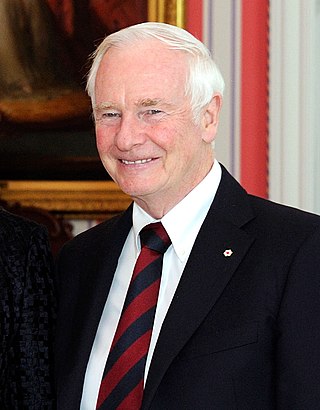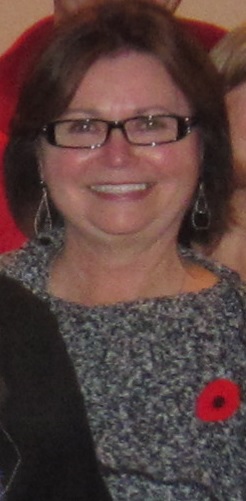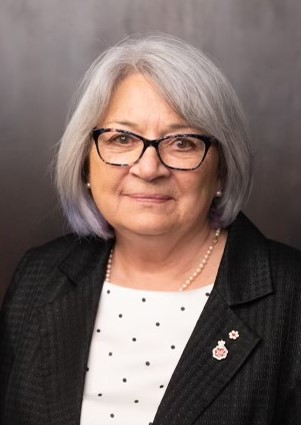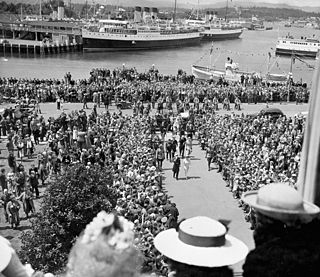Related Research Articles

Richard Bedford Bennett, 1st Viscount Bennett was a Canadian lawyer, businessman, philanthropist, and politician who served as the 11th prime minister of Canada from 1930 to 1935.

The governor general of Canada is the federal representative of the Canadian monarch, currently King Charles III. The king or queen of Canada is also monarch and head of state of 14 other Commonwealth realms and resides in the United Kingdom. The monarch, on the advice of his or her Canadian prime minister, appoints a governor general to administer the government of Canada in the monarch's name. The commission is for an indefinite period—known as serving at His Majesty's pleasure—though, five years is the usual length of term. Since 1959, it has also been traditional to alternate between francophone and anglophone officeholders. The 30th and current governor general is Mary Simon, who was sworn in on 26 July 2021. An Inuk leader from Nunavik in Quebec, Simon is the first aboriginal person to hold the office.

The monarchy of Canada is Canada's form of government embodied by the Canadian sovereign and head of state. It is one of the key components of Canadian sovereignty and sits at the core of Canada's constitutional federal structure and Westminster-style parliamentary democracy. The monarchy is the foundation of the executive (King-in-Council), legislative (King-in-Parliament), and judicial (King-on-the-Bench) branches of both federal and provincial jurisdictions. The current monarch is King Charles III, who has reigned since 8 September 2022.

Rideau Hall is the official residence of the governor general of Canada, the representative of the monarch of Canada. Located in Ottawa, the capital of the country on a 36-hectare (88-acre) estate at 1 Sussex Drive. The main building consisting of approximately 175 rooms across 9,500 square metres (102,000 sq ft), and 27 outbuildings around the grounds. Rideau Hall's site lies just outside the centre of Ottawa. It is one of two official vice-regal residences maintained by the federal Crown, the other being the Citadelle of Quebec.

Daniel Roland Michener was a Canadian lawyer, politician, and diplomat who served as the 20th governor general of Canada from 1967 to 1974.

David Lloyd Johnston is a Canadian academic, author, and statesman who served as the 28th governor general of Canada from 2010 to 2017. Johnston was the special rapporteur appointed to investigate reports of foreign interference in recent Canadian federal elections until his resignation on June 9, 2023.
The orders, decorations, and medals of Canada comprise a complex system by which Canadians are honoured by the country's sovereign for actions or deeds that benefit their community or the country at large. Modelled on its British predecessor, the structure originated in the 1930s, but began to come to full fruition at the time of Canada's centennial in 1967, with the establishment of the Order of Canada, and has since grown in both size and scope to include dynastic and national orders, state, civil, and military decorations; and various campaign medals. The monarch in right of each Canadian province also issues distinct orders and medals to honour residents for work performed in just their province. The provincial honours, as with some of their national counterparts, grant the use of post-nominal letters and or supporters and other devices to be used on personal coats of arms.

The monarchy of Australia is a key component of Australia's form of government, by which a hereditary monarch serves as the country's sovereign and head of state. It is a constitutional monarchy, modelled on the Westminster system of parliamentary democracy, while incorporating features unique to the constitution of Australia.

Judy May Foote is a former Canadian politician who served as the 14th lieutenant governor of Newfoundland and Labrador from 2018 to 2023. She was the first woman to hold the position.
Australia is a constitutional monarchy whose Sovereign also serves as Monarch of the United Kingdom, New Zealand, Canada and eleven other former dependencies of the United Kingdom including Papua New Guinea, which was formerly a dependency of Australia. These countries operate as independent nations, and are known as Commonwealth realms. The history of the Australian monarchy has involved a shifting relationship with both the monarch and also the British government.

Mary Jeannie May Simon is a Canadian civil servant, diplomat, and former broadcaster who is serving as the 30th governor general of Canada since July 26, 2021. She is Inuk on her mother's side, making her the first indigenous person to hold the office.

Since 1786, members of the Canadian royal family have visited Canada, either as an official tour, a working tour, a vacation, or a period of military service. The first member to visit was the future King William IV in 1786. In 1939, King George VI became the first reigning monarch to tour the country.

Jeremy John Heywood, Baron Heywood of Whitehall, was a British civil servant who served as Cabinet Secretary to David Cameron and Theresa May from 2012 to 2018 and Head of the Home Civil Service from 2014 to 2018. He served as the Principal Private Secretary to Prime Ministers Tony Blair and Gordon Brown from 1999 to 2003 and 2008 to 2010. He also served as Downing Street Chief of Staff and the first Downing Street Permanent Secretary. After he was diagnosed with lung cancer, he took a leave of absence from June 2018, and retired on health grounds on 24 October 2018, receiving a life peerage; he died a fortnight later on 4 November 2018.

The 1939 royal tour of Canada by King George VI and Queen Elizabeth took place from 17 May to 15 June, covering every province in Canada. Taking place in the months leading up to the Second World War, the tour was undertaken to strengthen trans-Atlantic support for the United Kingdom in anticipation of a potential war while also showcasing Canada's status as an independent kingdom of the British Empire.
Joan Marie Aylward is a former Canadian politician serving as the 15th and current lieutenant governor of Newfoundland and Labrador. She previously sat in the Newfoundland and Labrador House of Assembly from 1996 to 2003 as a member of the Liberals. She represented the electoral district of St. John's Centre.
The Advisory Committee on Vice-Regal Appointments was established on 4 November 2012 to assist the government of Canada with the appointment of the governor general of Canada, provincial lieutenant governors, and territorial commissioners. The committee was disbanded following the defeat of the Conservative Party of Canada, led by Stephen Harper, in the 2015 federal election and remains "dormant" under Harper's successor as prime minister, Justin Trudeau.

Dame Patricia Lee Reddy is a New Zealand lawyer and businesswoman who served as the 21st governor-general of New Zealand from 2016 to 2021.

The Sapphire Jubilee of Elizabeth II on 6 February 2017, marked 65 years of Queen Elizabeth II's reign. The longest-reigning monarch in British history, Elizabeth II was the first British monarch to have a sapphire jubilee.
The 1995 New Zealand Royal Visit Honours were appointments by Elizabeth II to the Royal Victorian Order, to mark her visit to New Zealand that year. They were announced via a Special Honours List on 10 November 1995.

Marie Wilson is a Canadian journalist and public administrator who served as one of three commissioners of the Truth and Reconciliation Commission of Canada (TRC). Born in Petrolia, Ontario, Wilson holds a Bachelor of Arts degree in French language and literature and a Master of Arts degree in journalism, both from the University of Western Ontario. She spent over 35 years working in journalism for the Canadian Broadcasting Corporation, including as regional director for CBC North and as adviser to the South African Broadcasting Corporation. In 2015, she served as a professor of practice at McGill University. Prior to her appointment to the TRC, she was employed by the Workers' Safety and Compensation Commission of the Northwest Territories as vice president for operations.
References
- ↑ "The Prime Minister announces the appointment of Sheila-Marie Cook as Secretary to the Governor General of Canada", March 16, 2012
- ↑ "Newly Appointed Recipients of the Royal Victorian Order" Archived 2010-12-15 at the Wayback Machine , March 16, 2012
- ↑ "Sheila-Marie Cook", March 16, 2012
- ↑ General, The Office of the Secretary to the Governor (12 November 2020). "Cook, Sheila-Marie Suzanne [Individual]". reg.gg.ca. Retrieved 2020-12-14.